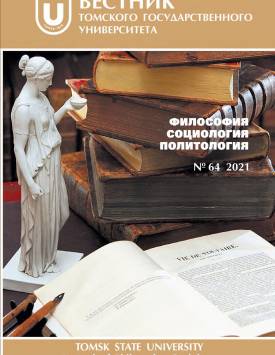Social Well-Being of the Professional Medical Community During the COVID-19 Pandemic in Rostov Oblast (Based on the Materials of In-Depth Interviews)
After the World Health Organization recognized the situation with the spread of the new coronavirus infection as critical, a huge array of a wide variety of studies, mainly of applied value, appeared. Many of these studies are devoid of a methodological basis and semantic grounds because not enough time has passed for a fundamental understanding of what and how to study. For the correct understanding of the essence and real state of the social well-being of medical workers, a system of both internal and external control is required. Internal control is a key task of state health policy at the federal, regional, and municipal levels. External control is the prerogative of third-party public and scientific organizations capable of representing the quantitative and qualitative characteristics of social processes in the health care sector, giving them a neutral and objective assessment. A rational form of external control is the sociological diagnosis of the effects of the pandemic, both for public health and for the social and mental health of certain professional groups. The task of modern sociology is to quantitatively and qualitatively measure components of social health of the professional medical community, the integral criterion of which is social well-being as a subjective perception and assessment by an individual medical worker of the level of their achievements, degree of realization of their needs, and the effectiveness of their life strategy, taking into account the sociocultural context (at the micro- and macrolevel) and objective factors (vectors of social policy of the state, situation in health care and public health, rhetoric of the mass media, and level of education in society). The concept of social well-being is closely related to the phenomenon of social adaptation. Merton’s conceptual scheme of social adaptation (with a slight change in the sequence of types with an emphasis on the constructiveness of behavior models, rather than their anomalousness) is used to study the types of behavior of medical workers in a complex epidemiological situation. The theoretical significance of the typologization of social adaptation models is to reduce the conglomerate of behavioral acts and individual life worlds of medical workers to simplified scientific constructs for the correct understanding of the current situation and development of tools for social work with the professional medical community if there is a real need for them. The concept of social adaptation allows considering social well-being not as some kind of artificial objective reality, but as a dynamic characteristic of the actor’s professional thinking.
Keywords
social well-being,
medical community,
healthcare institute,
COVID-19 pandemic,
red zone,
Rostov regionAuthors
| Vyalykh Nikita A. | Southern Federal University | sociology4.1@yandex.ru |
Всего: 1
References
Горшков М.К. Социальное самочувствие населения в условиях реформ: региональный аспект. М. ; СПб. : Нестор-История, 2011. 176 с.
Жегусов Ю.И. Влияние социального самочувствия населения на динамику деструктивных социальных процессов в России // Коммуникология. 2018. № 4. С. 15-26.
Суняйкина О.Н. Понятие «социальное самочувствие» в социологии // Вестник Мордовского университета. 2011. № 3. С. 98-101.
Сысоев П.Г. Оценка социально-психологического состояния врачей // Вестник Ивановской медицинской академии. 2011. № 4. С. 10-13.
Усова Е.Н. Социальное самочувствие: теоретико-методологические подходы к исследованию // Саратовский научно-медицинский журнал. 2017. № 13 (3). С. 554-559.
Шлыкова Е.В. Повседневный риск как фактор социального самочувствия (на примере молодежи мегаполиса) // Теория и практика общественного развития. 2018. № 3. С. 24-27.
Осинский И.И., Бутуева З.А. Социальное самочувствие: понятие, факторы формирования и показатели измерения // Вестник Бурятского государственного университета. 2015. № 14. С. 38-45.
Гареева И.А. Социальное самочувствие врачей в современной системе здравоохранения // Вестник ТОГУ. 2014. № 4 (35). С. 295-300.
Соловей А.П., Шухно Е.В. Интерпретация и операционализация концепта «социальное самочувствие» // Синергия. 2018. № 4. С. 72-77.
Chang D., Xu H., Rebaza A, Sharma L., Dela Cruz C.S. Protecting health-care workers from subclinical coronavirus infection // The Lancet Respiratory Medicine. 2020. № 8 (3). e13. URL: https://pubmed.ncbi.nlm.nih.gov/32061333 (accessed: 11.09.2021).
Cox C.L. Healthcare Heroes': Problems with media focus on heroism from healthcare workers during the COVID-19 pandemic // Journal of Medical Ethics. 2020. № 46 (8). P. 510-513.
Dennerlein J.T., Burke L., Sabbath E.L., Williams J.A.R., Peters S.E., Wallace L., Karapanos M, Sorensen G. An integrative total worker health framework for keeping workers safe and healthy during the COVID-19 pandemic // Human Factors. 2020. № 62 (5). P. 689-696.
Dewey C., Hingle S., Goelz E., Linzer M. Supporting clinicians during the COVID-19 pandemic // Annals of Internal Medicine. 2020. № 172 (11). P. 752-753.
Вялых Н.А. Факторы социального самочувствия профессионального медицинского сообщества в условиях пандемии нового коронавируса // Гуманитарий Юга России. 2021. № 1. С. 102-110.
Vyalykh N.A., Nor-Arevyan O.A., Posukhova O.Y., Mosienko O.S., Cherevkova A.I. Methodological matrix for sociological study of social well-being of the professional medical community during a complex epidemiological situation // Turismo: Estudos & Praticas (UERN). 2021. № 1. URL: http://natal.uern.br/periodicos/index.php/RTEP/index (accessed: 15.09.2021).
Посухова О.Ю. Институциональные условия профессионального развития медицинских работников (по материалам социологического исследования в период борьбы с COVID-19) // Теория и практика общественного развития. 2021. № 6. С. 41-50.
Регионы России. Социально-экономические показатели. 2020: стат. сб. / Росстат. М., 2020. 1242 с.
Мосиенко О.С. Удовлетворенность медицинского сообщества мерами государственной поддержки в сложной эпидемиологической ситуации (на материалах глубинных интервью медиков Ростовской области) // Гуманитарий Юга России. 2021. № 3 (49). С. 64-76.
Нор-Аревян О.А. Консолидация профессионального медицинского сообщества в условиях пандемии коронавируса (на материалах глубинных интервью в Ростовской области) // Гуманитарий Юга России. 2021. № 3 (49). С. 77-89.
Черевкова А.И. Профессиональное становление медиков в условиях пандемии коронавируса (по материалам глубинных интервью) // Вестник Южно-Российского государственного технического университета (НПИ). Серия: Социально-экономические науки. 2021. Т. 14, № 3. С. 95-101.

